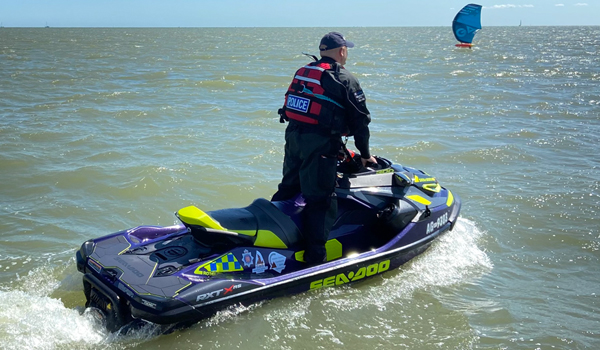Making waves
Essex Police has launched this year’s Operation Wave-Breaker to tackle anti-social behaviour promote water safety during the summer along the county’s coastline.
Essex has the second-longest coastline in England, which, coupled with bright summer sunshine, makes it extremely attractive to visitors.
Each weekend until the beginning of September, the Essex Police Marine Unit will mount high-visibility patrols on the water and along the shoreline.
The officers will also attend marine community events to provide advice about staying safe on the water and ‘Street Meets’ with colleagues from community policing teams.
Last year, incidents of anti-social behaviour relating to PWCs (personal watercraft) dropped by a quarter from those reported in 2020 – from 99 to 74.
And this year, Essex Police Marine Unit officers hope incidents will drop still further as more people realise council bye-laws are in place to keep them, other water-users and a multitude of wildlife safe from harm.
Sergeant Alex Southgate said: “Many of our rivers, creeks and estuaries are used by swimmers, paddleboarders and sailors as well as local businesses and other agencies. They are also home to many endangered and protected species of birds and wildlife.
“For these reasons, areas close to the shore are subject to speed limits which help to make sure the Essex coastline is a safe place for everyone.
“During Operation Wave-Breaker, we focus our patrols along the coast in areas known for suffering repeat water-based anti-social behaviour, such as speeding on personal watercraft.”
During the 2022 season, which ran from April until the start of September, the unit’s six officers stopped and spoke to 179 PWC riders and 49 people in power boats about their behaviour on the water.
As a result, 164 verbal warnings were given and 12 PWC riders reported for court action after speeding over the eight nautical miles per hour limit in the areas of either Lawling Creek or Mayland Creek on the River Blackwater, contravening council byelaws.
Among them were a 34-year-old Maldon man who was fined £220 and ordered to pay £150 costs and a victim surcharge of £58; a 25-year-old Rochford man who was fined £153 and ordered to pay £150 costs and a victim surcharge of £61; a 34-year-old South Ockendon man who received two fines, £40 and £80, and was ordered to pay £270 costs; and a 35-year-old Rainham man who was fined £153 and ordered to pay £180 costs – total £333.
Sgt Southgate said: “Prosecutions are a last resort. We will speak with people first and educate them around the byelaws and speed limits for the areas they are in.
“However, some of the behaviour we saw last year was very dangerous and, where our safety advice was ignored and people were putting other’s safety at risk, we took the necessary action to support our district councils with prosecutions.
“And we will not do hesitate to do so again this year.”
He said the two Maldon District Council-funded PWCs used by the Essex Police Marine Unit officers were “a valuable asset” for policing shallow coastal areas and rivers as they enable our officers to reach isolated areas, inaccessible from the unit’s rigid-hulled inflatable boat, or rhib, Sentinel.
Their versatility means officers use them for all types of marine policing activity. As well as tackling water-based anti-social behaviour, they are used to search for missing people along the shoreline, for general patrolling and for engaging with marine communities.
The force says one major benefit of the PWCs is their ability to break down barriers between the police and the public, particularly other PWC riders. And, with their distinctive Essex Police livery, they are proving to be a significant attraction at community engagement events.
“Officers make the most of this interest which they use to start conversations about crime prevention and criminal activity, which we know is under-reported by our marine and river communities, whether they use the water for leisure or for work,” said Essex Police.
“They understand how the theft of a boat or equipment can affect livelihoods and businesses and they understand that there are crimes which are unique to the marine and river communities.
“Officers use this engagement to make people aware of specific crime prevention measures they can take to protect themselves, their property and their business and use the information they provide to help the force to effectively target its resources and operational activity.”
The marine unit polices 562 miles of waterways and coastlines from the Thames at Crayford Ness to the River Stour in Manningtree, working closely with partners such as the RNLI, the National Crime Agency, Port of London Authority, Border Force and the Coastguard Agency.
The majority of the team’s work focuses on anyone who uses the water along Essex’s coast and rivers – not only boat-owners but paddle-boarders, canoeists and kayakers, kite-surfers and people using personal watercraft, in fact, anyone who uses the water for leisure.
Officers investigate and help to prevent crimes which matter to marine communities, such as the theft of boats and marine equipment, and they provide specialist crime prevention advice, too.
By listening to the people who live and work on and by our waterways and coastlines, Essex Police says it can better understand the issues causing them concern, taking action to resolve these problems, ensuring water-users remain safe and that those who cause harm to marine communities are held accountable for their actions.



